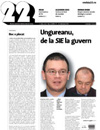News that Mihai Răzvan Ungureanu has been appointed to the post of Prime Minister has been met with a wary response in Romania where people believe that the change will have no impact on the ongoing austerity drive. If President Traian Băsescu had wanted to run the risk of calling for an early general election — as it stands elections are scheduled for November 2012 — he would have appointed a more self-effacing politician. In nominating Ungureanu, explains România Liberă, he has “bet everything on a single card” -
Băsescu is gambling with the fate of the political right in Romania, because if there was one thing that undermined the credibility of the Boc government, it was not the austerity measures and the sporadic demonstrations, but the impression of weakness and endless compromise. That said, few things are more ridiculous than the opposition’s TV declaration to the effect that “we are now being governed by the Securitate”. They have no understanding of the functioning of the Foreign Intelligence Service (SIE) or of the role of its director. They are simply projecting their own experience of former agents of the Securitate. The SIE has a very different role, which it conducts in close collaboration with the CIA. Espionage is not about sexy girls and sports cars, but about the clear definition of missions and their efficient execution.
For Jurnalul National, however, Ungureanu is a secret service “golden-boy”, whose appointment marks the conclusion of “a cycle of national disintegration” and the realisation -

… of the president’s dream: the creation of a Euro-Balkan military junta, that is capable of using fear to rein in an impoverished population. What is a regime supported by the secret services, if not a military one? The President wanted to show that he is the boss of a police state so as to silence his partners and his adversaries.
In Adevărul, political analyst Cristian Pârvulescu also takes issue with the appointment “of a spy as Prime Minister” -

That an active spy has been able to take over as government leader says a great deal about the level of democracy in Romania. It is just one more step towards the presidentialisation of the regime. Moreover, given the fact that in 1989 he was a deputy member of the Central Committee of the Union of Young Communists, it is clear that he lacks the moral qualities required for the post. He is one of the nomenklatura. If the lustration law [purge of former communist party cadres] was in force, he would not be allowed to take on such an important role for the state.
This assertion is contradicted by România Liberă, which points out that Ungureanu “was not a member of the Securitate” or secret service under Ceaușescu -

… he was a civil servant who was politically appointed to manage a difficult institution, and he made an honourable success of this task. Five years after he was forced by the prime minister of the time to give up his post as foreign minister, it is ironic to see that he has now been mandated to form a government.
“Is the boss of the SIE the right solution for our country?” wonders the weekly Revista 22 -

It is unlikely. What is the message sent by [the appointment] of a secret service chief to lead the government in an election year? How will he cope with the jigsaw of political interests and corruption in the party [the ruling Democratic Liberal Party (PD-L)] and in cabinet? How will he deal with the barons of the PD-L and the issue of election campaign financing, so as to ensure the holding of regular elections? Lets have no illusions about the grim legacy that Boc has left behind him.
Was this article useful? If so we are delighted!
It is freely available because we believe that the right to free and independent information is essential for democracy. But this right is not guaranteed forever, and independence comes at a cost. We need your support in order to continue publishing independent, multilingual news for all Europeans.
Discover our subscription offers and their exclusive benefits and become a member of our community now!












